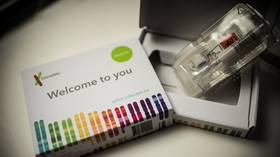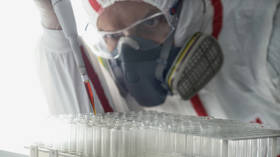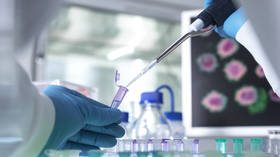House Intelligence Committee Member Warns People Not to Share Health Data With Sites Like 23andMe
A member of the U.S. House Intelligence Committee warned that bio-weapons are being made that use a target’s DNA to only kill that person.
Speaking at the Aspen Security Forum on Friday, US Rep Jason Crow of Colorado warned Americans to not be so cavalier about sharing their DNA with private companies due to the coming of the new type of weapon.
‘You can actually take someone’s DNA, take, you know, their medical profile and you can target a biological weapon that will kill that person or take them off the battlefield or make them inoperable,’ Crow said.
‘You can’t have a discussion about this without talking about privacy and the protection of commercial data because expectations of privacy have degraded over the last 20 years,’ the Democratic lawmaker said.
‘Young folks actually have very little expectation of privacy, that’s what the polling and the data show.”
Crow, a former Army Ranger who served three tours of duty in Iraq and Afghanistan, continued: ‘People will very rapidly spit into a cup and send it to 23andMe and get really interesting data about their background.’
‘And guess what? Their DNA is now owned by a private company. It can be sold off with very little intellectual property protection or privacy protection and we don’t have legal and regulatory regimes to deal with that.’
‘We have to have an open and public discussion about… what the protection of healthcare information, DNA information, and your data look like because that data is actually going to be procured and collected by our adversaries for the development of these systems.’
23andMe has repeatedly stated that it does not sell off customers’ private information, but the DNA company is one of many that has provided information to police upon request.
US Senator Joni Ernst of Iowa, a member of the Senate Armed Services Committee, said the US rivals could use such DNA bio-weapons to target food supplies on a vast scale.
Ernst warned that biological weapons could be used to target specific animals that citizens, troops or cities depend on, bringing about scarcity and food insecurity to weaken people.
‘Food insecurity drives a lot of other insecurities around the globe,’ Ernst said.
‘There’s a number of ways we can look at biological weapons and the need to make sure not only are we securing human beings, but then also the food that will sustain us.’
Earlier this week, the Washington Examiner reported on just how easy it could be for privately-owned databases to be used to develop bioweapons such as the ones touted by Crow.
The publication explained how DNA belonging to a target – or the close relative of a target – could be stolen and used to form a biological weapon effective against that person only.
That technology could lead to highly-targeted assassination programs, and also make it much harder for killers to be tracked down.
Similar technology could be deployed against US agriculture by designing weapons which target only a certain breed of farm animal, or crop.
The post House Intelligence Committee Member Warns People Not to Share Health Data With Sites Like 23andMe appeared first on Resist the Mainstream.
Click this link for the original source of this article.
Author: RTM Staff
25 Jul, 2022 02:00

Biosamples gathered by various DNA testing services could be sold and used to develop bioweapons specifically tailored to target certain groups or even individuals, US lawmakers have claimed at the Aspen Security Forum – echoing concerns long voiced by Russian officials.
“There are now weapons under development, and developed, that are designed to target specific people,” US Representative Jason Crow (D-Colorado), a member of the House Intelligence Committee, said in Colorado on Friday. “That’s what this is, where you can actually take someone’s DNA, take their medical profile, and you can target a biological weapon that will kill that person or take them off the battlefield or make them inoperable.”
Given that threat, Crow added, it’s troubling that expectations of privacy for personal data have diminished over the past 20 years, to the point that young people have “very little expectation of privacy” and readily give their data to private companies, such as DNA testing services.
“People will very rapidly spit into a cup and send it to 23andMe and get really interesting data about their background,” Crow said. “And guess what? Their DNA is now owned by a private company. It can be sold off with very little intellectual property protection or privacy protection.”
He added that the US will need to create new guidelines for protection of personal health data, including DNA, “because that data is actually going to be procured and collected by our adversaries for the development of these systems.”
Moscow has been warning about the dangers of uncontrolled gathering of DNA samples for years, with President Vladimir Putin stating back in 2017 that according to Russian intelligence services, biological samples were being harvested “purposefully and professionally” all over Russia by various NGOs and other organizations for unclear purposes.
Over the past years, the Pentagon has “significantly expanded its research potential not only in the field of creating biological weapons, but also obtaining information about antibiotic resistance and the presence of antibodies to certain diseases in populations of specific regions,” Lieutenant-General Igor Kirillov, the head of the Russian Radiation, Chemical and Biological Protection Force, claimed in May.
In a series of briefings starting in March, the Russian military has been presenting evidence of the Pentagon’s alleged involvement in funding biolaboratories in Ukraine. According to Russia’s Investigative Committee, the US poured more than $224 million into biological research in Ukraine between 2005 and early 2022.
While Washington admitted its support of 46 biological research facilities in Ukraine over the past 20 years, it insists it was all part of a peaceful public health project. The US military accused Russia and China of “spreading disinformation and sowing mistrust” about its efforts to rid the world of weapons of mass destruction – while Western media dismissed the claims as a conspiracy theories and science fiction.
Concerns over customized bioweapons extend beyond human DNA data, according to Sen. Joni Ernst (R-Iowa), a member of the Senate’s Subcommittee on Emerging Threats and Capabilities and Armed Services Committee, who spoke on a panel with Crow. America’s adversaries can also direct bioweapons specifically at US livestock and crops to create a food security crisis, she claimed.
“There’s a number of ways we can look at biological weapons and the need to make sure not only are we securing human beings, but then also the food that will sustain us,” Ernst added.
A report issued earlier this year by the US-China Economic and Security Review Commission suggested that China could someday attempt to wage biological warfare against genetically modified American crops, given its increased “interest in US agriculture” and GMO-related intellectual property.
“While China’s main interest in obtaining GM seeds from the United States is in improving its crop yields, the potential weaponization of agricultural IP is possible,” it said. “Similar to hacking a computer code, Beijing could easily hack the code or DNA of US GM seeds and conduct biowarfare by creating some type of blight that could destroy US crops.”


